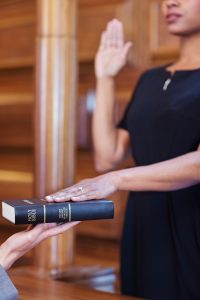Oklahoma Bar Journal
Long-Awaited Changes to Rule 702 Impact Qualification and Admissibility of Expert Witness Testimony and May Signal Changes to Oklahoma Law
By Timothy F. Campbell and Anamayan Narendran

KOTO | #609891892 | stock.adobe.com
On April 24, 2023, United States Supreme Court Chief Justice John G. Roberts Jr. transmitted amendments to Rules 106, 615 and 702 of the Federal Rules of Evidence to then-Speaker of the House Kevin McCarthy and Vice President Kamala Harris in her ex officio role as president of the Senate.[1] After Congress failed to modify or reject the changes, the chief justice’s proposed revisions went into law Dec. 1, ending a rule-making process begun by the Advisory Committee on Evidence Rules in 2017.
Of those changes, the new amendments to Rule 702 have the potential to be most impactful for litigators, as Rule 702 governs the qualification and admissibility of expert testimony in federal court. Further, as we will see, state laws analogous to Rule 702, such as Oklahoma’s 12 O.S. §2702,[2] may also be in line for revision prompted by the change to Rule 702.
At present, Rule 702 reads as follows:
A witness who is qualified as an expert by knowledge, skill, experience, training, or education may testify in the form of an opinion or otherwise if:
- the expert’s scientific, technical, or other specialized knowledge will help the trier of fact to understand the evidence or to determine a fact in issue;
- the testimony is based on sufficient facts or data;
- the testimony is the product of reliable principles and methods; and
- the expert has reliably applied the principles and methods to the facts of the case.
The amended Rule 702, which seeks to clarify the standard a proponent of expert testimony must meet to satisfy the rule and present the testimony to the jury, reads as follows:
A witness who is qualified as an expert by knowledge, skill, experience, training or education may testify in the form of an opinion or otherwise if the proponent demonstrates to the Court that it is more likely than not that:
(a) the expert’s scientific, technical, or other specialized knowledge will help the trier of fact to understand the evidence or to determine a fact in issue;
(b) the testimony is based on sufficient facts or data;
(c) the testimony is the product of reliable principles and methods; and
(d) the expert’s opinion reflects a reliable application of the principles and methods to the facts of the case.
The changes, while somewhat subtle, serve a number of purposes. First, the new Rule 702 cements the court’s “gatekeeper” function of keeping unhelpful and unreliable expert testimony from the jury. This change makes clear that it is the judge, not the jury, who determines Rule 702’s elements have been met.[3] Once the determination has been made to admit expert testimony, matters of weight are left to the jury and remain proper subjects for cross-examination.
Second, the amended Rule 702 provides further clarity through the express inclusion of a preponderance of the evidence standard, applicable to all four elements of the rule, by adding that the court must find “it is more likely than not that” the proponent of the evidence has satisfied Rule 702’s requirements. According to a memorandum prepared by the Advisory Committee on Evidence Rules, this change was prompted by the perceived misapplication of Rule 702 by a substantial number of courts: “[T]he Committee resolved to respond to the fact that many courts have declared that the reliability requirements set forth in Rule 702(b) and (d)—that the expert has relied on sufficient facts or data and has reliably applied a reliable methodology—are questions of weight rather than admissibility, and more broadly that expert testimony is presumed to be admissible.”[4]
Finally, the amendment’s emphasis on greater judicial scrutiny of expert witness testimony continues with additional language in 702(d). That change adds a requirement that “the expert’s opinion reflects a reliable application of the principles and methods to the facts of the case.” This change appears to empower courts to not only examine whether the principles and methods employed were reliable but to go a step further and evaluate whether the expert’s opinion itself is also reliable. As the Advisory Committee noted, the change seeks to ensure an expert “stays within the bounds of what can be concluded by a reliable application of the expert’s basis and methodology.”[5] Therefore, a proponent of expert testimony needs to now show that both the means and conclusion reached by the expert are reliable.
Taken together, these amendments further empower the court and will necessarily make it more difficult to admit expert testimony than under the prior version of the rule. The new Federal Rule of Evidence 702 places a heavier burden on litigants to demonstrate the reliability of expert testimony. As the Advisory Committee eluded, these changes were prompted in part by the perceived misapplication of the rule fueled by the Supreme Court’s seminal decision in Daubert v. Merrill Dow Pharmaceuticals, 509 U.S. 579 (1993), and its progeny. Daubert was largely silent on the topic of the appropriate standard to apply to the Rule 702 elements: “And while Daubert mentions the standard, Daubert does so only in a footnote in the midst of much discussion about the liberal standards of the Federal Rules of Evidence.”[6] The footnote in question consists largely of a quotation to Rule 104(a) that addresses preliminary questions governing privileges, witness qualification and admissibility of evidence, and it counsels that such threshold determinations are generally to be made by the court.[7] The footnote concludes with the vague proviso that “[t]hese matters should be established by a preponderance of proof.”[8] Per the Advisory Committee, the amended Rule 702 is intended to clear up any lingering confusion and establish that “admissibility requirements are to be determined by the court under the preponderance standard.”[9]
The focus of the new rule will require further consideration of litigants selecting experts who they believe will meet the now-clarified preponderance of the evidence standard. The new rule will require litigants to ensure their experts are armed with the appropriate methodologies and principles in order to meet this threshold or fear the risk of being stricken by the court applying this heightened standard. Similarly, expert conclusions must now also be shown to be reliable. The new Federal Rule of Evidence strengthens and reinforces the court’s gatekeeping role to ensure experts with unreliable methodologies and principles and unhelpful or unfounded conclusions never reach a jury. The importance of litigants understanding and considering the intricacies of the new rule is vital to the selection and presentation of expert witnesses. The new Federal Rule of Evidence 702 is bound to bring about additional challenges in Oklahoma federal courts to experts who lack the requisite knowledge and expertise in relation to the facts of the given case or who come to court with unreliable opinions.

Gorodenkoff | #462415038 | stock.adobe.com
CHANGES TO OKLAHOMA LAW?
What do the amendments to Rule 702 mean for practice in Oklahoma courts, if anything? The first possibility, of course, is that the Legislature amends Section 2702 to bring it in line with the new Rule 702. Such a change would be consistent with Oklahoma’s practice of more or less adopting the Federal Rules of Evidence and Federal Rules of Civil Procedure wholesale. Should this occur, presumably the impact would be similar to that on the federal level, with Oklahoma courts imposing more stringent controls on expert qualification and admissibility of opinions.
A second option would be for the Oklahoma Supreme Court to, in an appropriate case, simply adopt the new Rule 702 view absent amendment by the Legislature to Section 2702. After all, Oklahoma’s present expert witness regime is based on federal case law, which itself was at least ostensibly based on Rule 702. At present, Oklahoma courts utilize a framework based on Daubert and its progeny – Kumho Tire Co., Ltd. v. Carmichael, 526 U.S. 137 (1999) – as first adopted in Christian v. Gray, 2003 OK 10, 65 P.3d 591. Section 2702 is cited only twice in the body of Christian, while Daubert appears dozens of times. Given its reliance on Daubert as opposed to Rule 702 or Section 2702, the court in Christian only addressed the appropriate evidentiary standard for admitting expert testimony in passing without expressly adopting a standard the proponent of the testimony must meet.[10] Now that the rule on which Daubert was at least in part based is set to change, it would make sense for courts to follow suit and adopt the new Rule 702 standards.
Yet another option would be to declare that the new amendments did not alter the state of Oklahoma law at all. At least one federal appellate circuit has taken the position that Rule 702 always required each element to be met by a preponderance of the evidence and that the new revisions simply clear up any judicial misunderstanding to the contrary:
On April 30, 2021, the Committee unanimously approved a proposal to amend Rule 702, part of which is motivated by its observation that in “a number of federal cases ... judges did not apply the preponderance standard of admissibility to [Rule 702’s] requirements of sufficiency of basis and reliable application of principles and methods, instead holding that such issues were ones of weight for the jury.” In order to address this “pervasive problem” both of the current draft amendments to Rule 702 would contain the following language in the advisory committee’s notes:
[U]nfortunately many courts have held that the critical questions of the sufficiency of an expert’s basis [for his testimony], and the application of the expert’s methodology, are generally questions of weight and not admissibility. These rulings are an incorrect application of Rules 702 and 104(a) and are rejected by this amendment.[11]
Regardless of the path chosen, it seems inevitable that Oklahoma courts will have to eventually acknowledge the revised Rule 702 and respond in some fashion. How and when that occurs are open questions. What is clear though is that the standard for qualification and admissibility of expert witness testimony will likely become more stringent as a result.
ABOUT THE AUTHORS
 Timothy F. Campbell is an attorney at the Oklahoma City office of Hall Booth Smith PC. Mr. Campbell’s practice focuses on medical malpractice defense as well as insurance coverage disputes. He is a 2011 graduate of the OCU School of Law.
Timothy F. Campbell is an attorney at the Oklahoma City office of Hall Booth Smith PC. Mr. Campbell’s practice focuses on medical malpractice defense as well as insurance coverage disputes. He is a 2011 graduate of the OCU School of Law.
 Anamayan Narendran is an attorney at the Oklahoma City office of Hall Booth Smith PC. Mr. Narendran’s practice focuses on aging services, business transactions, general liability, health care, insurance coverage, labor and employment, medical malpractice, premises liability, and professional malpractice and ethics matters. He is a 2021 graduate of the OU College of Law and a 2018 graduate of the University of Arizona.
Anamayan Narendran is an attorney at the Oklahoma City office of Hall Booth Smith PC. Mr. Narendran’s practice focuses on aging services, business transactions, general liability, health care, insurance coverage, labor and employment, medical malpractice, premises liability, and professional malpractice and ethics matters. He is a 2021 graduate of the OU College of Law and a 2018 graduate of the University of Arizona.
ENDNOTES
[1] Supreme Court of the United States, Order (April 24, 2023), https://bit.ly/49XaW9F.
[2] While not identical to Rule 702, 12 O.S. §2702, like most provisions of the Oklahoma Evidence Code, is modeled on the Federal Rules of Evidence. In present form, 12 O.S. §2702 provides as follows:
If scientific, technical or other specialized knowledge will assist the trier of fact to understand the evidence or to determine a fact in issue, a witness qualified as an expert by knowledge, skill, experience, training or education may testify in the form of an opinion or otherwise, if:
- The testimony is based upon sufficient facts or data;
- The testimony is the product of reliable principles and methods; and
- The witness has applied the principles and methods reliably to the facts of the case.
[3] Comm. on Rules of Prac. & Proc., Report of the Advisory Committee on Evidence Rules (May 2022), https://bit.ly/47VFtTy.
[4] Id.
[5] Id.
[6] Id.
[7] Daubert, 509 U.S. 579, 592, n. 10 (1993).
[8] Id.
[9] Id.
[10] “One federal court has stated that the proponent of an expert’s testimony bears the burden of satisfying the test for admissibility of evidence. ‘The proponent need not prove that the expert’s testimony is correct, but she must prove by a preponderance of the evidence that the that the testimony is reliable.’” Christian, at ¶23, at 603 (citing Moore v. Ashland Chem. Inc., 151 F.3d 269, 276 (5th Cir. 1998, en banc)).
[11] Sardis v. Overhead Door Corporation, 10 F.4th 468, 283 (4th Cir. 2021); see also, In re Anderson, No. 15-21681, 2023 WL 2229355, at *3 (W.D. Tenn. Jan. 20, 2023) (taking the position that the revised Rule 702 acts to clarify how the rule should have been applied all along); Al Qari v. Am. Steamship Co., No. 21-cv-10650, 2023 WL 5202311, at *4 (E.D. Mich. Aug. 14, 2023) (asserting the changes “are not substantive, but rather clarify how the Rule was meant to be applied since it was first amended in 2000”).
Originally published in the Oklahoma Bar Journal – OBJ 95 No. 1 (January 2024)
Statements or opinions expressed in the Oklahoma Bar Journal are those of the authors and do not necessarily reflect those of the Oklahoma Bar Association, its officers, Board of Governors, Board of Editors or staff.
